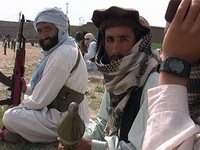Afghan Military Strategy: Robert Gates Says U.S. Must Not Wait for Election's Outcome
Sunday in an interview with CNN's John King Rahm Emanuel, White House Chief of Staff, said President Obama is now asking tough questions about Afghanistan "that have never been asked on the civilian side, the political side, the military side and the strategic side." It was a not so subtle dig at Mr. Obama's predecessor and was meant to distract from the White House's mishandling of the war.

The Bush administration did in fact conduct a top-to-bottom strategic review of Afghanistan in 2008. That review was provoked by two developments.
The first was that Pakistan's government wobbled starting in 2006. It cut deals with tribes that created safe havens for the Taliban and al Qaeda and then became distracted from fighting terrorism as President Pervez Musharraf was pressured to leave office and replaced by a new democratic government. The second was al Qaeda's decision to refocus its efforts on Afghanistan after having been driven from Iraq.
After consultations with the Obama transition team, the Bush administration's strategic review was not released nor were its recommendations implemented. Instead, the review was handed over to the incoming president. Drawing on it, Mr. Obama announced a "comprehensive new strategy for Afghanistan and Pakistan" on March 27, The Wall Street Journal reports.
Meanwhile, in Afghanistan election authorities began delivering ballots with U.N. assistance across the country on Thursday, as hurried preparations for the Nov. 7 runoff in the insurgency-plagued nation's presidential election got under way.
International election monitors called on authorities to avert the widespread fraud that marred the first round of voting in August. Scores of election staff accused of misconduct have been axed, and new personnel need to be hired.
President Hamid Karzai will face former Foreign Minister Abdullah Abdullah in the runoff. Abdullah announced Wednesday that he was ready to take part, one day after Karzai bowed to intense U.S. pressure and acknowledged he fell short of the 50 percent threshold needed for victory in the Aug. 20 election. U.N.-backed auditors threw out nearly a third of Karzai's votes because of fraud.
In Washington, U.S. officials said a power-sharing arrangement between Karzai and Abdullah to avoid a runoff was still possible, although it would be up to the Afghans, The Associated Press reports.
It was also reported, after recent criticism of U.S. President Barack Obama's perceived dithering on whether to send additional troops to Afghanistan, the White House said Wednesday that a decision may be near.
Many caution against acting before a credible government is established, while others say the president must make a decision immediately.
Secretary of Defense Robert Gates said Tuesday that the United States must not sit on its hands waiting for the election's outcome. The statement came during the run-up to the Nov. 7 runoff between Afghan President Hamid Karzai and his rival Abdullah Abdullah, which was triggered when August's elections were marred by widespread fraud allegations.
Andy Johnson, director of the National Security Program at the Washington, D.C.-based Third Way and former staff director of the Senate Intelligence Committee, said military victory in Afghanistan was intertwined with the country's political situation, Xinhua reports.
Subscribe to Pravda.Ru Telegram channel, Facebook, RSS!


